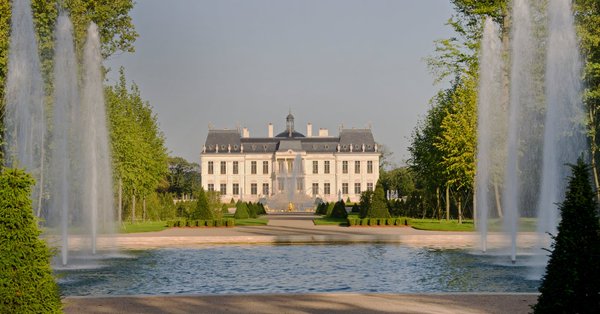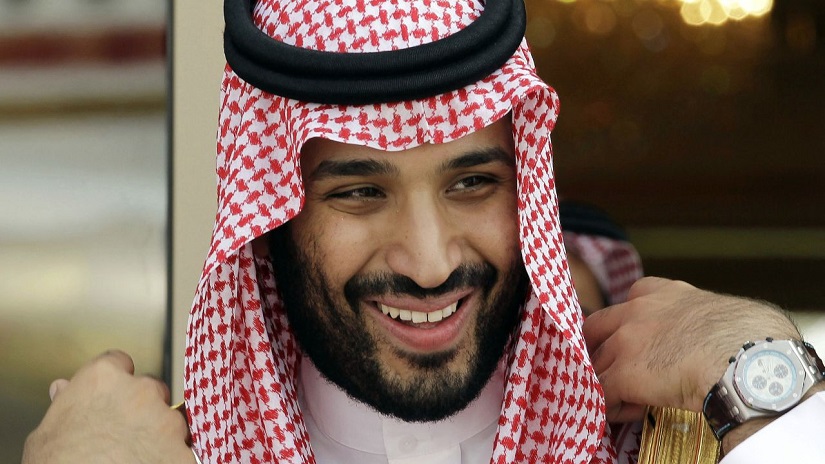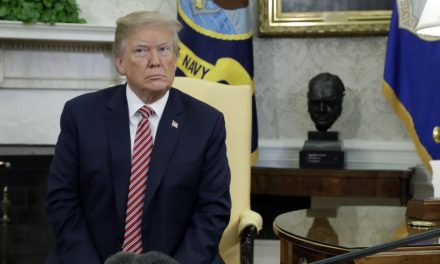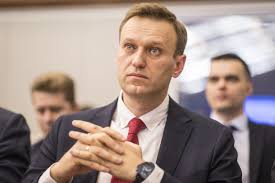Update
27 December 2017
The Saudi prosecutors have released 23 more people from detention in the Ritz-Carlton hotel. Okaz newspaper reported that they had reached deals with the government by agreeing to pay a certain amount of money as ransom.
Among those released were: Saoud al-Daweesh, the former chief executive of Saudi Telecom, Ibrahim al-Assaf, a former finance minister and board member of Saudi Aramco, former assistant minister of finance Mohammed bin Homoud Al Mazyed, Prince Turki bin Khalid, and businessman Mohy Saleh Kamel, reported Wall Street Journal.
The paper also reported that the Saudi authorities were asking billionaire Prince Al-Waleed Bin Talal, for $6bn in return for his release. He has refused to pay any money as it would be construed as an admission of guilt.
Those who have not reached a settlement will face trial in the court of law.
Update
Prince Mohammed acquires a French chateau for $300million.
18 December 2017
French investigative website Mediapart as well as New York Times reported that Saudi Crown Prince Mohammed bin Salman was the real owner of a French chateau described as the world’s most expensive residential property valued at $300million. The ownership of the property is concealed through a web of shell companies. These shell companies lead to the prince as the ultimate owner of the chateau Louis XIV. The newly built mansion looks like a 17th-century chateau at nearby Versailles. The mansion sits in a 57-acre plot of land. The developer tore down a majestic but crumbling 19th century chateau at the site to build this new mansion.
The prince paid $450million for Leonardo Da Vinci’s “Salvator Mundi” at an auction this year.
Crown Prince Mohammed is also the owner of a 440-foot a $494million-yacht with two pools and a helipad. He also owns a 620-acre estate in Conde-sur-Vesgre, known as “Le Rouvray,” an hour from Paris by car.
Saudi-watchers say that Prince Mohammed is playing a risky game while he put his enemies (his royal cousins and Saudi business elites) in jail for corruption, he pays record prices for his personal collection of the world’s most expensive things. His actions are in sharp contrast with his preaching of fiscal conservancy at home. Instead of a reformer he comes out as another royal stealing from the wealth of the people.

chateau Louis XIV
Update
14 December 2017
In a televised speech yesterday (Wednesday) to the country’s consultative Shura council, Saudi Arabia’s King Salman bin Abdulaziz said that his government was determined to confront corruption with “justice and decisiveness”, giving his support to the crown prince, his son, for crackdown involving mass detention of top Saudis including royals.
Salman also said the government will work with the private sector to get economic diversification and to move away from dependency on petroleum.
He said that the kingdom will focus on “Vision 2030” economic reform plan to find new sources of revenue. He added that he had instructed the formation of a higher committee, headed by the crown prince, to fight corruption.
According to the public prosecutor, most of those detained have agreed to settlements to avoid prosecution. The rest could remain in custody for months.
The king condemned President Donald Trump’s decision to recognize Jerusalem as Israel’s capital and move the U.S. embassy there.
Young crown prince relaxed the ban on cinemas which came into operation in 1980. Many of Saudi Arabia’s clerics view Western movies and even Arabic films made in Egypt and Lebanon as sinful. He also lifted the ban on women driving from next year.
Such measures will make him popular among young population.
1 December 2017
Crown Prince of Saudi Arabia Mohammed bin Salman Al Saud (known as MBS) created an anti-corruption commission recently. Hours after its creation, 11 princes and 38 former government ministers, deputies and businessmen were detained in an anti-corruption sweep. They are being held in five-star hotels across the capital, Riyadh. The measures targeted many of his direct rivals and consolidated the prince’s power over the kingdom.
Muhammad bin Nayef, previous crown prince, was deposed by royal decree on 21 June 2017, and Mohammad bin Salman was made heir apparent to the throne. Prince Nayef, once-powerful interior minister, was put under house arrest, causing jitters in the Kingdom and dissatisfaction in the royal family. Prince Nayef was addicted to morphine and cocaine, due to an assassination attempt that left shrapnel in his body.
Saudi Arabian prince and billionaire Al-Waleed bin Talal, grandson of Saudi Arabia’s founder Abdulaziz ibn Saud, was also put under house arrest. His worth estimated at $18.7 billion by Forbes. He owns Four Seasons and Movenpick hotels in Beirut and the Savoy hotel in London. He also holds share investments in investments in Twitter, Apple, Rupert Murdoch’s News Corporation, Citigroup, the Four Seasons hotel chains and most recently in ride-sharing service Lyft.
Officially charges against him include money laundering, bribery and extortion. He had financial clout and warm a relationship with several princes in the family, including Mohammed bin Nayef, who was deposed by MBS in June. So, this detention effort is MBS’ attempt to consolidate his powers and neutralise potential power centres that could pose challenges to his ambition to ascend the throne. Although there may be several eligible princes to ascend the throne, they must be aware that only one could do so.
Other detainees include former finance minister Ibrahim al-Assaf, economy minister Adel Fakieh, former Riyadh governor Prince Turki bin Abdullah and Khalid al-Tuwaijiri, who headed the Royal Court under the late King Abdullah.
MBS claims that Saudi Arabia was dying a slow death for the past 10 years, coinciding mainly with the rule of the late King Abdullah, which left the kingdom’s coffers poorer by an estimated $400bn. He said the country lost one trillion $ to corruption in the past 25 years. He contends that those being held under detention now have misappropriated $800 billion abusing various positions they held in the kingdom. He claims that over the past three years the government has collected evidence of corruption by these people. He wants them to hand him over the $800 billion. He has not revealed the nature of evidence he has against them nor has he told what he would do with the money that he would get from them. MBS explained that business people who paid bribes to get services done by bureaucrats are not being prosecuted. Only those who pilfered money out of the government are being prosecuted. If there is sufficient evidence against them, why does not the Attorney General frame charges against them in a court of law. At least this will give the detainees a chance to defend themselves. It will also be transparent to the public as well as foreign investors. But if the process ends up arbitrary, opaque, and holding to ransom, aimed more at getting more power, it will unnerve Saudi and foreign investors.
Prince Miteb bin Abdullah has been released after he agreed to a settlement with authorities of more than $1bn. Prince Miteb is accused of embezzlement, hiring ghost employees and awarding contracts to his own companies including a $10 billion deal for walkie talkies and bulletproof military gear worth billions of Saudi royals. He was once seen as a contender to the throne. He is son of the late King Abdullah. Three other people have also reached settlements with the Saudi government. It is not clear whether Miteb would have fully free or if he would be under some form of house arrest.
According to an anticorruption official, although MBS wants to recoup $800 million lost to corruption, he will be satisfied if he gets at least $100 billion. He knows that it would be impractical get back $800 million.
Most of those held under detention are his relatives and descendants of the founder of the Al Saud dynasty. The House of Saud is the ruling royal family of Saudi Arabia. Muhammad bin Saud, along with his brothers, founded the Emirate of Diriyah, which was the First Saudi state (1744–1818) to be formed. The ruling faction of the family is primarily led by the descendants of Ibn Saud, the founder of the modern Saudi Arabia.
King Abdulaziz, a descendant of Ibn Saud, established the Kingdom of Saudi Arabia in 1932, and became its first King. He married 22 women from powerful clans. One of his wife was Hussa bint Ahmed Al Sudairi, a member of a powerful clan in Nejd. Seven sons King Abdulaziz had with this wife came to be known as ‘Sudairi Seven’, the most powerful clan in the Kingdom. King Salman is one of the ‘Sudairi Seven’. Abdulaziz, in 1920, had said that the further succession would be from brother-to-brother not from father-to-son. This tradition continued till 2015. In 2015 King Salman appointed his nephew Muhammad bin Nayef as Crown Prince and his son Mohammad bin Salman as the deputy crown prince. But in June 2017, King Salman deposed Muhammad bin Nayef of all positions, and made his son heir apparent to the throne, breaking the tradition.
Prince Mohammed launched a military campaign in neighbouring Yemen in March 2015. A Saudi-led coalition, acting on an invitation from the Yemen government, has targeted the Iran-aligned Houthi movement. The war has caused more than 10,000 people. Both the US and UK are supporting the Saudi-led coalition with logistics and intelligence.
Saudi has agreed to ease a military blockade on Yemen after weeks of warnings from the UN and humanitarian groups that eight million people would be without running water and face starvation due to fuel shortages.
Mohammad bin Salman (MBS) told The New York Times in an interview published on Thursday “We don’t want the new Hitler in Iran to repeat what happened in Europe in the Middle East.” Saudi Arabia is backing the rebels who are fighting against the Syrian President Bashar Assad. MBS says Hezbollah is advising Houthi rebels waging a war against Yemen’s Saudi-backed government.
Iran is trying to establish its power base in the Middle East through two “Shia crescents” one from Iran, through Iraq and Syria to Lebanon, and a second from Bahrain to Yemen. Hezbollah accuses Saudi Arabia of partnering with Israel to suppress regional independence.
Prince Mohammed has also opened a new campaign against Tehran’s ally Hezbollah and its home country Lebanon. Two weeks ago, MBS summoned Lebanese Prime Minister Saad Hariri to Riyadh and told him to resign his post. Hairi announced his resignation from Riyadh. Hairi, dual Saudi-Lebanese national, has vast business interests in Saudi.
Egyptian President Abdel-Fatah el-Sissi and French leader Emmanuel Macron feel that Hariri’s resignation would plunge Lebanon it into a prolonged crisis that would fuel tension in the region and are trying to roll back Hariri’s resignation. This may be viewed by some as an anti-Saudi stand. On the way in his return trip from Riyadh, Hariri met el-Sissi and Macron.
The crown prince has aligned with Iraq’s Shia leaders to reverse Iran’s dominant role and beef up security on the kingdom’s northern border. He also wants to improve ties with the US under Trump, who is known for his antipathy to Iran.
Prince Mohammed led a diplomatic campaign to isolate Qatar, because of its alliance with Iran. Qatar rejected the accusations and said it’s being punished for not backing the authoritarian rule in Saudi.
Saudi Arabia’s economy is not in good shape. MBS announced a $500bn plan to create a business and industrial zone extending into the borders of Jordan and Egypt. The 26,500 square-km zone, known as NEOM, will focus on industries including energy and water, biotechnology, food, advanced manufacturing and entertainment, powered solely with wind power and solar energy.
Prince Mohammed’s wants to move the economy away from its dependency on oil and towards the private sector. He has planned to sell about five percent of national oil company Saudi Aramco next year as a part of his ‘Vision 2030’, designed with the help of McKinsey’s consultants. He wants to raise $100 billion from the IPO based on his own valuation of Aramco at $2 trillion. But investors do not think that Aramco is worth anywhere near his $2 trillion mark.
The crown prince is in favour of a more tolerant interpretation of Islam, and reforms have begun in this direction in areas like education, courts and the law. These were once in the exclusive control of the clergy. Saudi authorities are promoting elements of national identity without religious element.
Mohammed bin Salman announced in September that women will gain the right to drive in 2018. This is seen by foreign academics as a ploy to have a favourable impact on the international media and their allies and to promote themselves as reformists. They also silence anyone within Saudi Arabia for demanding those reforms.















